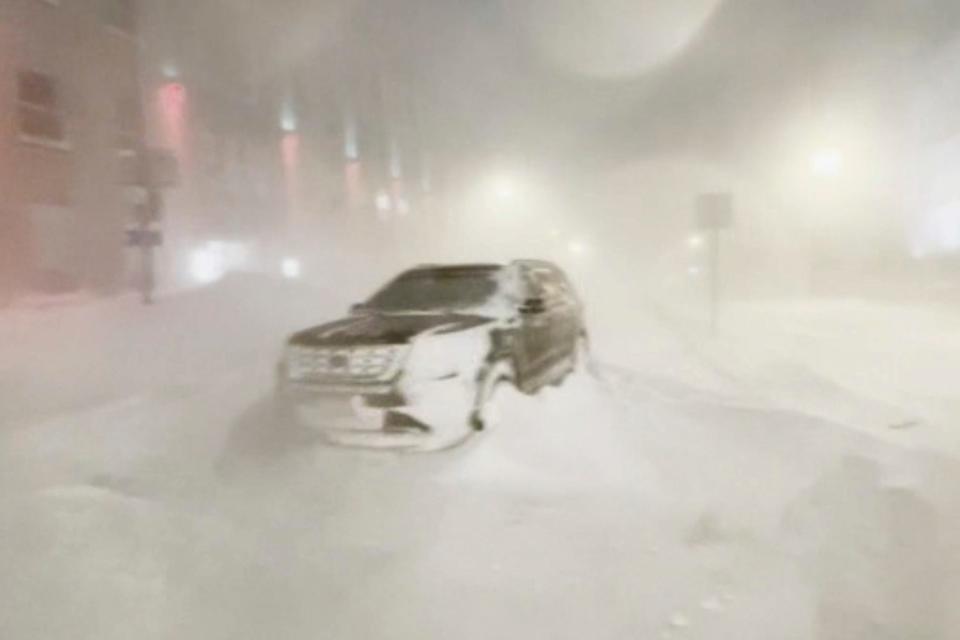The caregivers’ survival guide to power outages, extreme weather
The most recent storm in Michigan killed five residents, overturned trees, and knocked out power for hundreds of thousands of people. In the Christmas week blizzard that killed nearly 50 in Buffalo, most who died were older adults, undoubtedly raising concerns about how to keep elders safe, physically and mentally.
They were reminders to be prepared before the next severe storm or power blackouts, particularly if you’re a caregiver. If you’re responsible for someone who is older, has special needs, mobility challenges or disabilities, you may have added concerns. You may not be able to “act fast.” Now’s the time to sign up for emergency alerts, pack an emergency kit, and stock up on shelf-stable food.
Here are a few things caregivers can do to make sure their loved ones are safe before, during and after a natural disaster or power outage.

Caregiving preparations before a storm
Stay informed. If you have a cellphone, you’ll probably automatically receive Wireless Emergency Alerts from authorized federal, state, and local authorities. Keep in mind that in a major disaster, cell towers could malfunction, and if you’re using your phone, the battery could give out. Stay connected to local emergency management agencies by following their social media accounts.
Buffalo blizzard: How a catastrophic storm response failed a woman in life, then in death
Detroit residents can sign up for 365 alerts online and for power outage alerts. Text alerts are available in Buffalo and Rochester, too.
There’s no shortage of smartphone apps with weather updates. Download them to stay updated and make sure older adults and disabled neighbors are aware of weather forecasts, watches, and warnings. Be sure they are aware of any coming storm and its severity.
Caregivers: In severe storms, caregivers are a forgotten lifeline
The National Oceanic and Atmospheric Administration Weather Radio is always available with information directly from the National Weather Service with a battery- or hand-powered weather radio.
While staying informed is important, it’s important that everyone’s calm. To limit anxiety, restrict TV watching and weather updates to a certain time of day rather than running the television or radio all day long.
Get the team ready. Form a support team, swap contact information, assign duties and stay in touch about plans. Identify a substitute caregiver, in case you’re unavailable. Give that person a key to the house and debrief them on daily routines.
Buffalo blizzard: Erie County, snowmobile clubs working on formal blizzard agreement
Get the home ready. Help seniors by reinforcing doors and windows and clearing loose items from outside the home. While outdoors, make sure furnaces or drains aren’t blocked and check for potential hazards. Keep large objects away from exits, and that’s particularly vital for older adults or those with physical disabilities. Heat or cool the home before bad weather arrives. If possible, have a generator or safe battery-powered space heater.
Have “emergency supplies” on hand. Extreme weather can occur in any season. Once a severe storm hits, it could potentially be a couple of days before electricity is restored or roads are clear. Perhaps more than others, older adults need an emergency kit that will meet their specific needs. Pack ahead, perhaps when the elder is sleeping, to minimize anxiety.
Red Cross urges caregivers to place essential items in a duffel bag or small suitcase with wheels for easy transport. Disaster Planning Tips for Senior Adults lists supplies for people with disabilities. Keep the bag next to or under the bed, for easy reach. The Americans with Disabilities Act Action Network recommends that all items are marked with fluorescent tape, large print or braille, for those who are visually impaired.
Caregiving: Florida shelters can help during storms. Why don’t more people use them?
Supplies should include:
Emergency phone numbers, including the number to a pharmacy, in a prominent accessible place or programmed into a cellphone
Flashlights with extra-wide beams and high-powered bulbs and extra batteries. Keep them in places that are handy.
Blankets, sleeping bags and pillows
Medical devices and equipment, and diabetic supplies
Battery-powered radio and extra batteries
Cellphone car charger, in case of power failure
A first-aid kit
If the senior is on daily medication and vitamins, make sure there is enough for at least three days
Plenty of bottled water
Ready-to-eat non-perishable food, canned juices and condensed milk, peanut butter, comfort food, manual can openers and utensils
Extra food and water and a collar with ID tag for service or support animals or other pets
Essential documents in a dry, fireproof place. Email copies of the documents to yourself.
Whistles
Tools such as a wrench or pliers to be able to turn off utilities
A spare pair of glasses, contact lenses, or hearing aid with extra batteries
Wet wipes, antibacterial soap, toilet paper, hand sanitizer and heavy-duty plastic trash bags.
Cash in various bills, in case a purchase is necessary and an ATM is unavailable
Towels, masks, rags, and N95 masks to protect airways.
Make sure aids such as canes and walkers are at the ready. Ready.gov recommends that power wheelchair users have a manual chair as a backup.
Comfort items such as blankets, noise-canceling headphones, soothing music, photographs, coloring books, stuffed animals, board games or familiar books, are important, particularly for those with cognitive issues. Set aside items that usually help with relaxation at home.
Tackle transportation. Make sure seniors have access to reliable transportation in case they need to leave home. Keep a blanket, flashlight, paper map, change of clothes and hard-soled shoes in the car. Know how to open the garage if the power is out and map out multiple routes. Coordinate with family members and friends, if necessary.
Prepare the senior citizen. Consider giving them a medical alert system that allows them to call for assistance or an Alzheimer’s necklace or bracelet. Make sure they know what to do and where to go if the power fails. Well in advance, register life-support customers with utility companies: National Grid at (800) 642-4272 (Buffalo); (800) 572-1111 (New York State Electric and Gas); DTE Energy (800) 477-4747 and ask if generators are available to borrow.
Caregiving: Michigan utility's generator program helps some, but need is great
Caregiving tips while the storm is raging
Keep them company. In a storm, the safest place to be is home. Storms can be stressful and induce anxiety in older adults, particularly those with cognitive disabilities. If possible, stay with them during a storm for reassurance and emotional support. In a calm voice, let them know they are safe. Don’t forget about other older neighbors. If you can’t be with them, establish a system for checking in regularly.
Consider a controlled environment such as a hotel or friend’s house, if you can’t stay put. Check pet policies before arriving to make sure animals are welcome. Try to keep the loved one’s regular schedule of naps and snacks.

Be prepared for a quick evacuation. Keep the car ready to go. That means a full tank of gas, inflated tires, unworn windshield wipers and topped fluids. Store work boots, gloves and a change of clothes in the car. Fill a small plastic bin with a flashlight, batteries and a first aid kit. Include tools, antifreeze, a snow brush, ice scraper and salt melting products. If you live in a housing complex, notify administrators that you’re leaving. Have several evacuation routes in mind.
If you’re stuck in your car and it’s cold out, run the engine periodically to keep the fuel line from freezing. Make sure your exhaust pipe is clear to avoid carbon monoxide poisoning.

Caregiver steps to take after a major storm
Phew! It’s over! Check on loved ones, older neighbors and family members. Return to normal settings and routines as quickly as possible. Keep in mind that resources like water and electricity may not be fully operational in the days immediately following a disaster. Alzheimer’s and dementia patients, in particular, often have difficulty figuring out what’s happening now and what’s happened in the past. Limiting access to news prevents further distress.
Turn on appliances to ensure they’re still operable, starting with the refrigerator and freezer. Check food to see if it’s still safe to eat. If the power has been out for more than four hours, measure the temperature with a food thermometer. The USDA says food may no longer be safe to eat if it’s reached an internal temperature of 40 degrees Fahrenheit, which can be checked with a food thermometer. FoodSafety.gov has a list of foods to discard at that point.
The Emergency Prescription Assistance Program of the U.S. Department of Health and Human Services (www.phe.gov/EPAP) helps those who need to refill prescriptions after disasters.
Stay away from downed power lines and tree branches. To report storm-damaged trees in Detroit, call 313-224-4444 or 800-867-5222 in western New York. If it’s an emergency, dial 911.
_____
More resources
Alzheimer’s Association 24/7 helpline
Disaster Preparedness for People with Disabilities (Federal Emergency Management Agency)
Eldercare Locator: (800) 677-1116, 9 a.m. to 8 p.m. ET weekdays. Launched in 1991, the Eldercare Locator is the only national information and referral resource for issues affecting older Americans.
Ready.gov: Emergency Communication Plan
The Red Cross (800-RED-CROSS)
This article originally appeared on Rochester Democrat and Chronicle: Caregiving during storms: A survival guide

